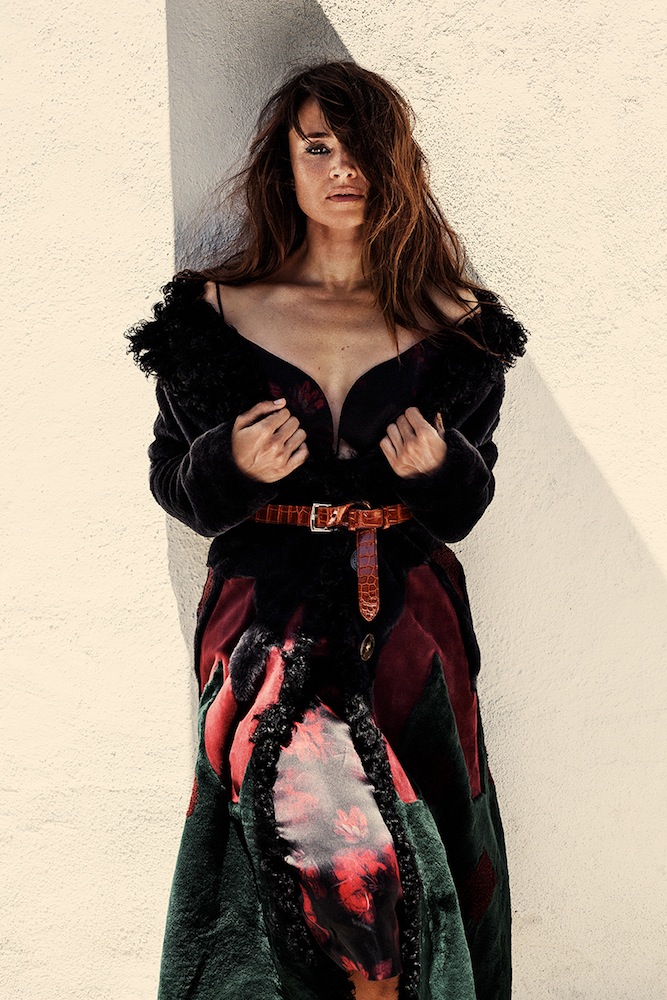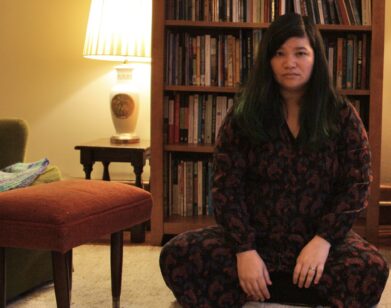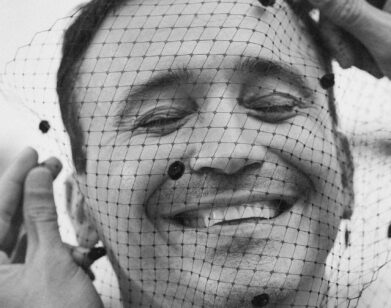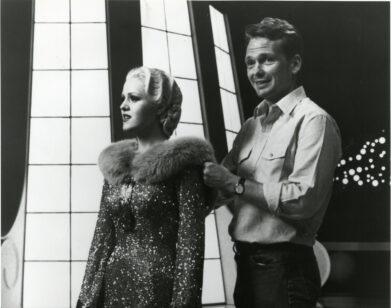The Multiple Lives of MÃa Maestro
ABOVE: MÍA MAESTRO IN LOS ANGELES, AUGUST 2014. PHOTOGRAPHY: BRIAN HIGBEE. STYLING: LIZETTE PENA. MAKEUP: VANESSA SCALI/TRACEY MATTINGLY. HAIR: CHRISTIAN WOOD/THE WALL GROUP.
After landing on the tarmac at JFK, a commercial plane goes radio-silent. The power shuts off; the crew is unresponsive and the passengers motionless. Two unlucky CDC agents, played by House of Cards‘ Corey Stoll and actress and singer Mía Maestro, are called to investigate. Once onboard, they discover a handful of survivors who exhibit increasingly bizarre symptoms. This is the premise of The Strain, FX’s summer sci-fi hit produced by Guillermo del Toro. Filmed over the winter in Toronto, the show has already been renewed for a second season.
Originally from Argentina, Maestro has been acting for over 15 years. Her body of work is diverse, to say the least, with roles in well-respected indies like Frida (2002) and The Motorcycle Diaries (2005), as well as blockbusters like The Twilight Saga: Breaking Dawn. On October 7th, a few days after the season finale of The Strain, Maestro will release a new album, Si Agua, via Canadian label Arts & Crafts. (“It doesn’t have a direct translation, but it would be ‘If Water,‘” she explains of the title.) Here, she talks to her friend and new labelmate, Canadian musician and Broken Social Scene member Feist.
LESLIE FEIST: I was scouring my mind for the things I would actually want to know. We’ve become friends in an off-the-grid, really human way; of course I was always aware of what you do, but we never really talked about any of that stuff. So I was thinking if that stuff came up over tea, what I would actually ask you. I came up with a little list here and because I am actually scared right now, I thought I should start with fear. Any time that I’ve been asked to act, the first thing I feel is fear—it seems so terrifyingly exposing—but you also seek out all of these incredible terrifying situations for the fun of it: scuba diving with sharks, the walk that you did across China, which I don’t know much about, to seek out tea trees. Those things are extremely intense and elemental. What is it about your relationship to fear? Is it a motivating pressure? Do you feel like it’s part of what moves you to make this big choices in your life? What do you find when you’re up against those intense moments? Awkwardly asked, but you know what I’m getting at…
MÍA MAESTRO: [laughs] No, it was beautifully asked. It’s actually a quite profound question. I had never thought about what I do for a living, or the things that I choose to do in my spare time, as confronting fear. With acting, I’ve been doing it since I finished high school so it’s a bit of second nature for me. I feel quite comfortable expressing emotions and working with an audience and a crew and exchanging these bizarre, fictional situations with my coworkers. You get put together in these really awkward, extreme moments.
FEIST: Your collective experience.
MAESTRO: Yeah. But I guess it has to do with what you mentioned—intensity. I do seek a lot of intensity.
FEIST: In acting there’s a collective safety—you’re all falling with the same parachute. There are all these other things that you do, even surfing, that are solitary endeavors. You talked about the three-dimensionality of the ocean, which I thought was so beautiful. You’re approaching these intense experiences that are physical with this sort of poetic philosophy. There must be something there that the fear charges—this living poetry that you’re undertaking to do that stuff.
MAESTRO: I think it’s that I’ve always felt really intense emotions, since I’ve been a little girl—sometimes almost feeling [like I’m] not able to act in the real world because the emotions will take over. As a girl, [I was] just trying to figure out how to live in society. It sounds a bit extreme. [laughs] I do feel that whenever I’m in nature—the sports that I choose to do, what I do throughout my vacations with my loved ones and my friends—they are quite intense moments. Connecting with nature is probably the most important part of my life. As I get older, [I am] trying to make it basically take over my life. But it is this intensity that really moves me, and an encounter with a big animal underwater or surfing a wave… we once talked about, when we went surfing here in California, the feeling of dancing with a wave that has been traveling for I don’t know how long throughout the ocean. You get to have the last dance with that wave.
FEIST: Well, maybe you have the poetry dancing with the waves. I was tripping on the waves and slipping on the banana peel of the wave. The poetry was pretty far for me. [laughs]
MAESTRO: [laughs] I don’t! I’m a total beginner, but after three or four sessions, you do get that feeling, or the glimpse of that feeling.
FEIST: You have the hand to guide you there. You have the ultimate spirit guide into that water world.
MAESTRO: Yeah, I have the right teacher to get me there. This conversation that we’re having right now, I often have it with my mother. She’ll be like, “Why are you doing this now? Why are you in the middle of China looking for tea? Why did you decide to dive with sharks when you were just offered a job?”
FEIST: Exactly. That’s what a parent is supposed to do; they are supposed to encourage you not to dive with sharks.
MAESTRO: Thinking about the roles that I’ve done throughout my life, they are pretty intense roles as well. If we go back to The Strain, the Guillermo [del Toro] show that I am doing in Toronto, it is extremely intense. It’s this horror, sci-fi show with this mythical element and these beautiful monsters created by Guillermo. It’s an apocalyptic show—these characters going through the end of the world—and somehow I feel quite at ease playing scenes like that.
FEIST: You have a familiarity with this intensity. You’re not entirely putting on a new character because you are familiar with that feeling in your real life.
MAESTRO: Yeah, it comes with a lot of ease. I’m sure it happens to you: there are certain moments where you’re either writing a song or performing and you feel like you have to push for something to come out the way you want it to come out, and then there are other situations where things just flow so naturally. When I’m storytelling, stories that are quite intense and dramatic, moments of life or death, those emotions and those characters flow quite easily for me. Whereas if it’s an easy kind of scene, an everyday situation where I’m just making a sandwich for someone, or it’s a restaurant scene where I actually have to seduce someone, that doesn’t come that easily to me. [laughs]
FEIST: You’re not seducing people in restaurants normally?
MAESTRO: [laughs] No. That’s when you’re like, “Okay, I have to plan this scene more.” But whenever there’s a scene—we’ve had so many in The Strain—where someone dies or you have to kill someone that you loved dearly…
FEIST: Oh my god, sometimes I want to kill people that I love dearly. [laughs]
MAESTRO: [laughs] There you go! But it comes easily. Also, as you just said, it’s finding a way of making those situations kind of therapeutic as well.
FEIST: Acting is a bit smoke and mirrors to me. It’s an embodiment of storytelling and when there’s a truly good actor, it seems like it’s invisible. You see the story happening through their body. I just saw Labor Day with Kate Winslet, and there’s this invisibility. It’s magic. As an actor, your whole self is being used to tell these stories—you’re implicit in it. It’s not like a painter —their paintings are up on a wall speaking for them, but there isn’t a giant portrait of their face next to the ninth painting. They get to be invisible in their work. Authors get to be invisible in their work. Musicians, we can turn on the smoke machines and keep the lights low. But as an actor you’re absolutely visible, and I wondered how you experience that visibility in your work? You’re so curious and open and genuine and very calm—when I first met you, those were the things I was first struck by. I just wondered how you deal with your visibility in your work and how people seeing you walk down the street must believe that you are the character—how do you experience that and turn it into something that isn’t totally corrosive?
MAESTRO: When you’re filming, you have so many people around, so there are some people that find it very easy to deal with so many people around them. I’m a bit of a loner. For my own mental sanity, whenever I’m not working I try to spend time by myself and do things that actually center me and things where I can find my own silence or my own moments with myself. It could be either serving tea or being underwater with a shark.
FEIST: I love that being underwater with a shark is calming.
MAESTRO: [laughs] It is quite calming because no one can talk to you underwater, you just hear your own breathing. It’s pretty incredible and calming. You have to be aware of where your body is—if your lungs are feeling okay, if you’ve gone up one pressure or down one pressure. [But] dealing with visibility, I’ve always been quite open. A lot of people come and talk about The Strain. People have been quite kind. I’ve never had a bad situation.
FEIST: So it’s positive. It’s not like you’re having to navigate people’s attacks.
MAESTRO: Yeah.
FEIST: I was going to ask you about tea, too. I had never met anybody who knew about tea, it’s a whole new thing that I learned about with you. Everything is so lovely and beautiful and curated. And again, [there’s] this sort of poetry of it—you were talking about the age of these leaves and how long the tree had been alive. How did you first find out about tea?
MAESTRO: I’ve always loved tea since I’ve been a little girl. It’s always been the most important meal in my family—the family would come together. [But] in my family, since we’re all from Argentina and Argentina has a British tea tradition, it had nothing to do with the tea that I drink [now]. What I do is a Chinese tradition of tea serving—the art of gongfu. It is like a living meditation and there’s dance involved by the way. There’s also the possibility of drinking amazing teas that have been harvested in the 1960s, ’70s, ’80s. I have teas from every decade. I got a lot of wonderful teas on my last trip to China after we finished filming the first season of The Strain in Toronto. I will bring them with me when I go back to Toronto to shoot.
FEIST: I want to ask you about music. Your record is coming out with Arts & Crafts.
MAESTRO: Yeah, in the States, Mexico, and Canada.
FEIST: We are labelmates! That’s so crazy. It’s a nice headquarters, especially since you’re now an honorary Canadian since you’ll be wintering there. [laughs]
MAESTRO: I need a Canadian passport. They should gift it to me.
FEIST: It’s true. The next time you pass through they’ll see you spent the winter and someone will hand you a flag. Is making music similar to making film—is it a collective effort or is it solitary?
MAESTRO: It’s very different for me—it’s quite solitary, especially when I’m writing the songs. We did record the record with the band in Iceland, and I had an amazing band recording it: Ben Frost played guitars and Nico Muhly did the arrangements; Shahzad [Ismaily] played the drums; Thomas Bartlett, who is one of my favorite piano players, played keyboards and piano. Working with the guys for seven days was really lovely because it did feel more like filmmaking or doing a play, but I found that everything that comes afterwards it quite solitary: going over the mixes and finding out what needed to be tweaked, listening and re-listening and re-listening, mastering, and the art for the cover. I got help from amazing people, but it’s still my own endeavor so it is very, very different. The same thing with the video I did for “Blue Eyed Sailor.” I worked with so many friends but it was up to me to make the last minute decisions. You are the creator; it’s your ship and you are the captain of it.
FEIST: You’re the director. You’re Guillermo del Toro of your own album.
MAESTRO: It’s interesting to me that you brought all these questions about diving and surfing. A lot of songs on the album have to do with my experiences in the water, or melodies that I’ve come up with when I’m on a boat or in the middle of nowhere or taking some quiet time on my own.
FEIST: That’s so funny. I literally had on my paper, “Why are you so moved by water?”
THE STRAIN AIRS SUNDAYS ON FX. SI AGUA COMES OUT IN CANADA, THE U.S., AND MEXICO ON OCTOBER 7 VIA ARTS AND CRAFTS AND NACIONAL RECORDS.







